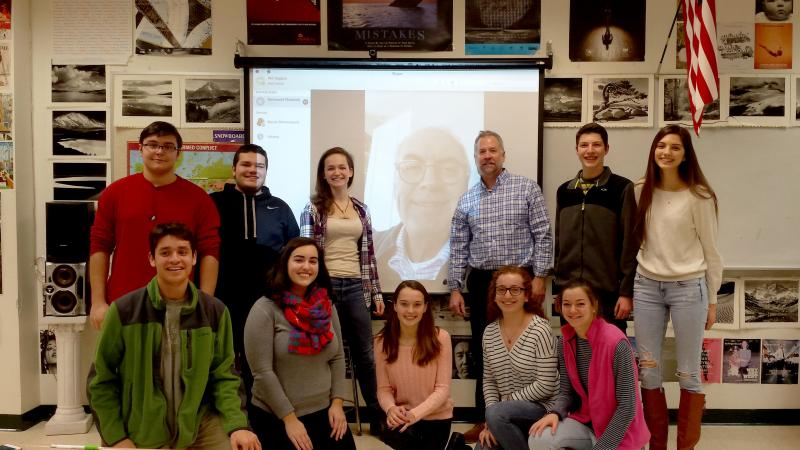Dartmouth High students chat with "In the Heart of the Sea" author, Nathaniel Philbrick
Streams of questions could be heard from Dartmouth High School teacher Wilbur Higgins’ Advanced Placement Capstone class as the students were able to Skype with Nathaniel Philbrick, author of “In the Heart of the Sea: The Tragedy of the Whaleship Essex.”
The non-fiction book, originally published in 2000, became the basis for a Ron Howard-directed film released last December. The book tells the story of a whaleship that lead to unprecedented disaster for its crew. Philbrick won the National Book Award for his work.
Launched from Nantucket in 1819, the Essex was led by Captain George Pollard Jr. and his mates, Owen Chase and Matthew Joy, as well as fourteen-year-old Thomas Nickerson and Chase's nephew, Owen Coffin.
While searching for whale oil, the ship was attacked by a sperm whale. This was the first recorded instance of a whale intentionally attacking humans. The starving, shipwrecked sailors descend into cannibalism. In the end, five sailors, including Pollard, Chase, and Nickerson, were rescued near the coast of South America.
Higgins contacted Philbrick’s publicist after the students read the novel in the fall of 2015 and watched the movie in December.
“I like the way he [Philbrick] described the hardships in detail,” said junior Alyssa Maitoza. “It was adventurous and exciting to read.”
Philbrick’s uncanny sense of humor shone through as he greeted the students with a “hit me baby,” to which each student asked a question that they lined up for the author.
“The biggest challenge is not going crazy,” said Philbrick as he gave some helpful advice to the students aspiring to become writers. “You can’t write effectively if you don't really understand the topic.”
Philbrick spent three-fourths of his time researching the book. He said that his hope was to create suspense and delay the inevitable outcome.
“The story is more about survival than the whale attack,” said Philbrick. “Each book is a different challenge.”
He mentioned that he loves learning and getting excited about stories.
“[Writing] requires a lot of concentration and the ability to sit for hours at a time,” said Philbrick. “I really needed life experience to find myself as a writer.”
He told the students that any kind of writing will help them find themselves as a writer.
“Reading is so essential,” said Philbrick. “The language becomes a part of you.”
Maitoza said she enjoyed how realistic Philbrick was about the writing process.
“He didn't sugarcoat it, but he also didn't shoot down the whole idea of becoming a writer,” said Maitoza.
“It was a great experience for everyone,” said Higgins. “It was impressive at how candid he was, and it was inspirational for an author to talk about the process.”













